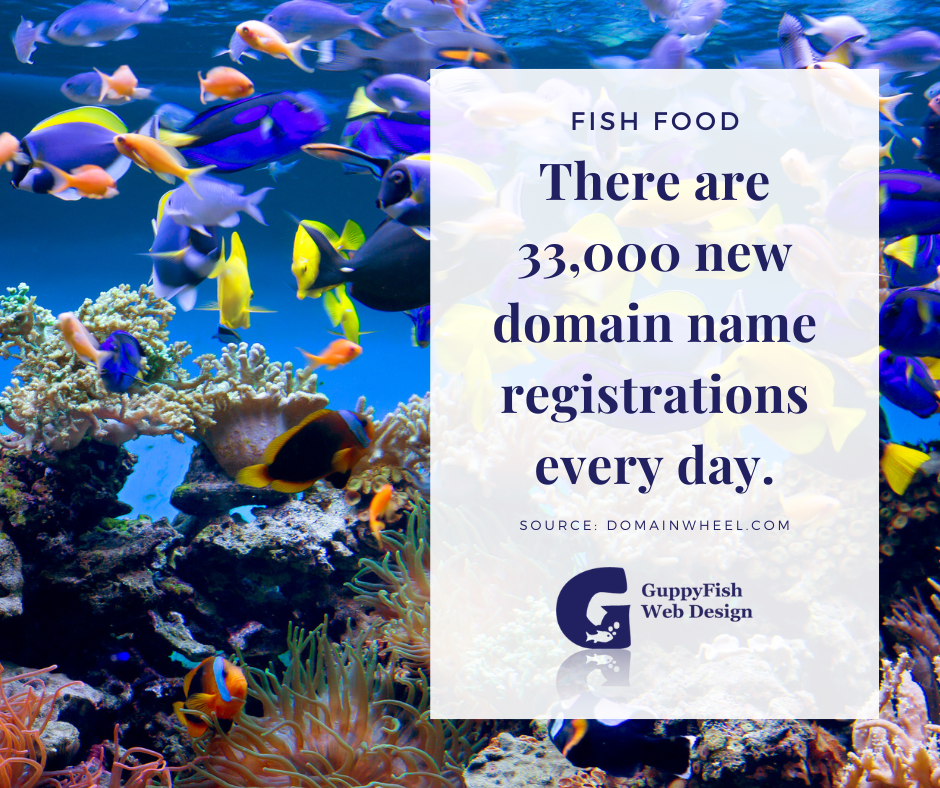Here you are, ready to create a website. Yay!! You’ve got your color scheme, a template, and some other basics. Now you need to figure out what to call your website. Whether you’re a marketing beginner or old pro, choosing the right domain name can have a huge effect on your site’s success. Let’s take a look at some best practices.
What’s a Domain Name?
I sometimes start working with a client and realize that he or she doesn’t know the definition of a domain name, so I don’t want to assume anything here. Your domain is the web address for your website; it’s what you type into the address bar to make the site appear. The first one (Symbolics.com) was registered in 1985. By 1992, .com registrations had reached 15,000.
With 33,000 new domain name registrations every day, you want to make sure you choose the perfect one so you stand out!

Types of Domain Names
Before diving into the world of domain names, you probably want to get to know the different types. I could get super technical here, but I’ll stay with the basics. In most cases, you’ll want a top level domain. The extension (last part of the web address) denotes the type of website. Check these out:
| .com | Stands for “commercial” – usually indicates a business or for-profit entity. |
| .net | Short for “network” – originally used for network technologies like internet service providers. |
| .org | Shorthand for “organization” – should be reserved for nonprofits and other organizations. |
| .edu | Stands for “education” – restricted only to universities, colleges, and other educational institutions |
| .gov | Denotes “government” – restricted only to governmental agencies. |
| .mil | Short for “military” – restricted only to US military branches. |
These days, you’ll also find a ton of other, less common choices. These include .biz and .info, among others. If you can get one of the more common choices above, do it. People will have a much easier time remembering it.
Additionally, for those located in a specific country or targeting a certain region, you’ll sometimes see country level domains. Some examples include .cn (China), .de (Germany), .es (Spain), and .eu (European Union). You can do an internet search and find a giant chart of all of them.
Choosing Your Perfect Domain Name
Now let’s talk about you. What should you consider when choosing the best website address for your particular situation? Some thoughts:
Check Regulations
First of all, make sure that the extension you want doesn’t have restrictions. As you can see in the chart above, certain domain types aren’t available to just anyone. While most people can get .com, .org, and .net domains, you can’t just register the others. Only the government can issue .gov addresses, and a .edu recipient must be a legitimate educational institution for which you must provide documentation.
Even though anyone can register a .com, .org, or .net, you should probably stick to the domain extension’s original intent. A retail store, for example, should avoid using .org if possible. Additionally, many of the country level domains have restrictions. For example, a .eu domain can only go to someone who proves citizenship in a member state.
Simple/Easy to Say
Next, make sure people can easily say or repeat the domain name you choose. Sure, you’ll probably have it written on business cards and the like, but how easily will someone remember it after you’ve told it to them? When I asked my Twitter network for input about this post, a friend responded with this:
Try saying the address out loud. How well does it roll off your tongue? Next, tell it to someone and ask them to repeat it back to you. If they can repeat it after some time has passed, even better.
In most cases, people just use the name of their business. This usually works just fine. You want to avoid, however, adding anything unnecessary. For example, I’ve seen people who have an LLC add it to their domain name. I think they probably see it as giving their business some legitimacy, showing they’re the real deal. Unfortunately, doing this adds several unnecessary syllables to their web address. Now, instead of saying “mybiz.com” to someone, you have to say “mybizllc.com.” I know you’ve worked hard for your LLC or INC, but that doesn’t mean you should include it in your domain name. Keep it simple.
Make Sure it’s Appropriate
What was that? Why would I even suggest that? I’m not doing anything inappropriate on my site, so my domain name will be fine! Not so fast…
I have to thank John Owens for reminding me about this. In response to my original tweet, he posted this:
I found some other examples, too. Let’s just say that you probably don’t want to use therapist in your domain name, even if that’s your field. In a web address, it too often translates to “the rapist,” and I’m pretty sure that’s not the impression you’d like to give. I saw one business called Therapist in a Box… I think therapistinabox.com may not work well. Teachers Talking ended up being teacherstalking.org. I think the teachers would like to talk without having anyone stalking them. If you find others, I’d love to see them in the comments. They really can bring out this reaction in you:

Tell What You Offer
If possible, your domain name should make it clear what you offer. You don’t want to overcomplicate things, but apexroofing.com tells me a lot more than just apex.com. Before I even go to the website, I know that this person offers roofing services. This also tells Google what you offer, which can only help your SEO. Again, make sure it translates well.
(Note to therapists: please use the word therapy, or counseling, or something other than therapist.)
If including your offering would make the domain name unnecessarily long or complicated, it’s ok to skip that part.
So what have we learned?
- Choose the extension based on your type of business or organization.
- Make sure the domain type doesn’t have restrictions.
- Keep it simple and easy to say.
- Write it down or type it out and see if it’s appropriate.
- Try to include what you offer.
Domain Name Availability
Now that you have some guidelines and can come up with the perfect domain name, there’s one more step. Make sure that name is available. No two websites can have the same address, so you need to make sure nobody has already registered the one you want.
Almost every domain registrar or web hosting company has a tool to look up a domain’s registration. If you don’t have a registrar yet, I recommend doing a who.is search.
Remember, asking others their impressions of your new domain name can never hurt. So drop those funny web addresses you find in the comments, and keep swimming along!




Really worth to read and understand before buying a domain name.
Thanks!